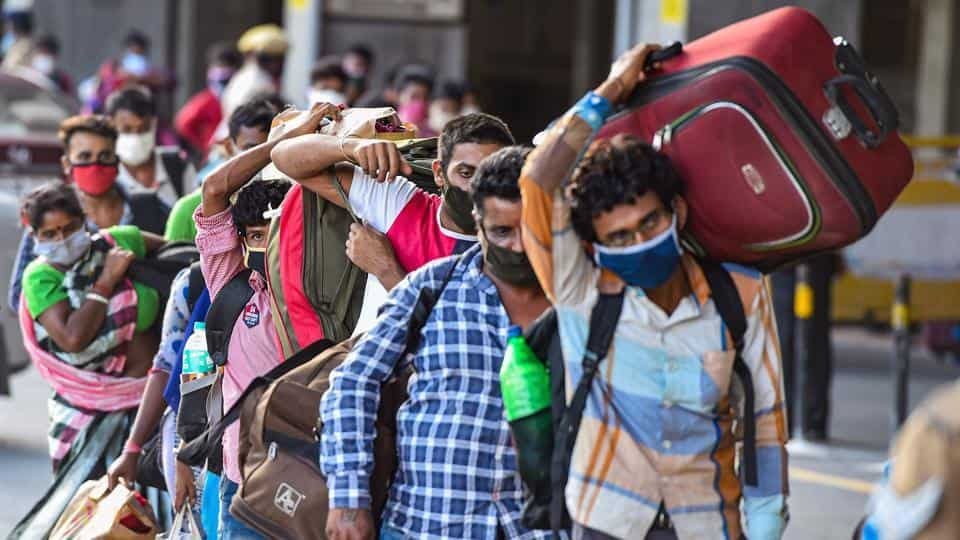Election Commission Urged to Grant Postal Ballot Rights to Migrant Labourers Rights groups have said migrant workers are excluded from the “basic constitutional right” of voting only because they are “away from home” I The Wire
21, Jul 2020 | The Wire Staff

Five civil rights groups, working in the area of access to rights and justice, have submitted a memorandum to the Election Commission urging it to provide migrant labourers the right to cast their vote through the postal ballot. They have said by doing so, the poll panel would be “taking a step towards a more inclusive democracy, ensuring that every segment of the adult and eligible Indian population gets to cast their vote and is not excluded for reasons of exigencies of their profession”.
In a letter to chief election commissioner Sunil Arora, also marked to Union law minister Ravi Shankar Prasad and secretary, legislative department G. Narayana Raju, the groups said they were writing on behalf of ‘migrant labourers’ for their inclusion as ‘notified electors’ under Section 60(c) of the Representation of People Act, 1951 read with Part IIIA of the Conduct of Election Rules 1961.
`Denied basic constitutional right as they stayed away from home’
Stating that “the very foundation of representative democracy is based on the will of all the Indian people getting reflected in policy and choices of parties of governance through the ballot,” the groups said India will not be able to look itself in the eye if a large section of its population was excluded from this “basic constitutional right” only because it remained “away from home”.
Through the memorandum, Anil Dharker and Teesta Setalvad of Citizens for Justice & Peace; Prafulla Samantara of Lok Shakti Abhiyan, Orissa; Samirul Islam of Bangla Sanskriti Mancha, West Bengal; Roma of All India Union of Forest Working People; and Zamser Ali of Bhartiya Nagarik Adhikar Suraksha Manch also highlighted the “sheer scale of the human tragedy that the COVID-19 pandemic driven lockdown unleashed on this population” of migrant labourers. They said one crucial element for the Indian democracy to learn from their plight must be to “secure them the right and facility to vote”.
Referring to the “mass exodus” of migrant labourers during the nationwide lockdown due to COVID-19, the memorandum stated that “the invisibility of this class of persons and their issues in political discourse contributed to the inability of legislators and policy makers to predict and prevent and mitigate the issue”.
Thus it urged that “granting postal ballot rights in their home cities is the most effective solution to the issues of political exclusion faced by migrant labourers”.
12% of migration is inter-state
The letter said as per 2011 Census, there were 45 crore internal migrants, a 45% increase over the 2001 Census. Of these, it said, 26% of the migration occurred inter-district within the same state while 12% of the migration took place inter-state or from one state to another.
It added that these numbers could be an underestimation and as per the actual numbers, accounting for circular, seasonal migration, could be much higher.
“Circular migration accounts for those migrants that have not permanently relocated to the host cities, and instead circulate between host and home cities,” the memorandum pointed out, adding that there could be 6-6.5 crore migrants in this, of which half would be inter-state migrants. But, the memorandum lamented that “despite this being a significant part of the Indian population, migrant labourers have been an ignored class in larger political and governance issues.”
It also stated that “migrant labourers are mainly from rural areas in poor regions and belong to the poorest socio-economic classes, including SC/STs and OBCs, and other minorities, who are often uneducated, lacking in assets, lands and specialised skills.”
Further, as per the 2011 Census, Uttar Pradesh and Bihar were the largest source of inter-state migrants, with 83 lakh and 63 lakh migrants respectively, while Maharashtra and Delhi were the largest receiver states.
Against 59.7% national average, only 31% inter-state migrants voted in 2009 LS polls
The memorandum said a 2012 study demonstrated that 78% of migrant labourers surveyed possessed voter ID cards and had their names present on voting lists of their home cities. However, a majority of them were unable to exercise their franchise due to economic constraints and their inability to undertake the commute to their home states in the one day nation-wide holiday that is declared for the polls.
“This entrenched systemic pattern of migration has meant the inability of migrant labourers to exercise their franchise in the parliamentary and state legislative elections,” it added.
According to one survey, the letter said, only 48 % of the migrant labourers surveyed voted in the 2009 Lok Sabha elections as compared to the national average of 59.7%. In the case of long distance migration, it said, only 31% of those surveyed voted in these polls.
`EC has mandate to ensure effective voting abilities for masses’
The memorandum also reminded the Election Commission that it has a constitutional mandate to effectuate effective voting abilities for the masses. The poll panel, it said, has “enabled flexible forms of voting by introduction of postal ballots for persons unable to vote at their registered constituency, special voters, service voters, voters on special duty, which refers to inter alia persons serving in the army, other defence personnel including their spouses”.
Making a case for the grant of postal ballot facilities for migrant labourers, the letter also recalled how over 16 lakh defence personnel have been registered as service voters, a new category of “absentee voters” – which included essential workers, voters above the age of 80 and persons with disabilities – has been provided access to postal ballot facilities, and how persons working with the Railways, the Delhi Metro Rail Corporation and media covering the elections have been designated as “essential workers” for the purpose of voting.
The original report by The Wire may be read here.










